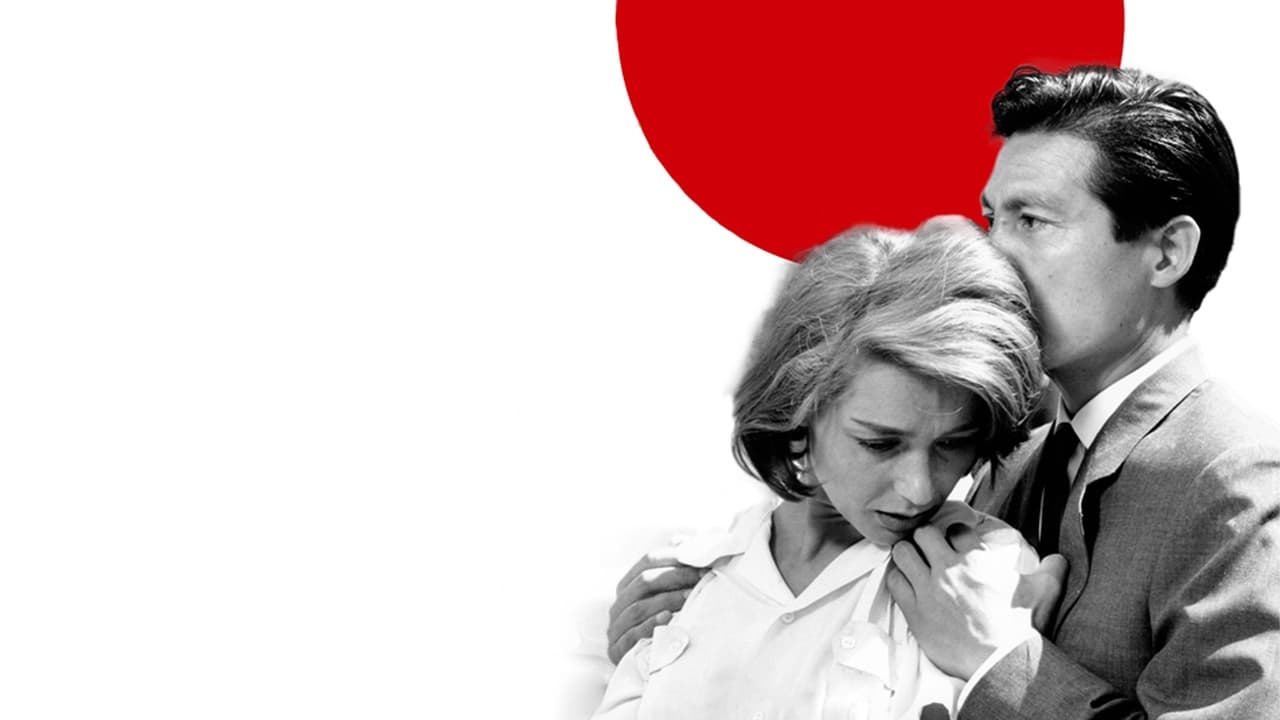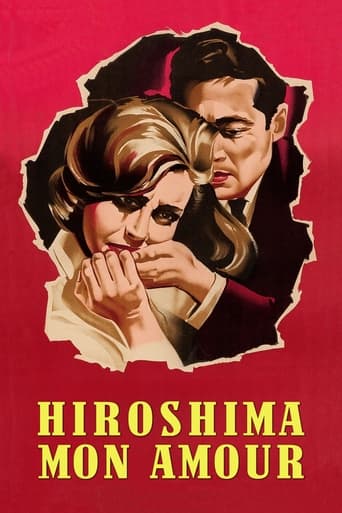



recommended
Disturbing yet enthralling
It’s fine. It's literally the definition of a fine movie. You’ve seen it before, you know every beat and outcome before the characters even do. Only question is how much escapism you’re looking for.
View MoreThere are moments in this movie where the great movie it could've been peek out... They're fleeting, here, but they're worth savoring, and they happen often enough to make it worth your while.
View MoreHiroshima Mon Amour is brilliantly made and brilliantly acted, with a thoughtful, poetic script by the great French writer, Marguerite Duras. Its images are lyrical, disturbing, fascinating, and its anti-war message is profound and still frighteningly relevant. But in terms of strict entertainment...Any film which begins with abstracted images of the entwined body parts of human lovers, slowly becoming encrusted with ash and (presumably) atomic fallout... and then spends an obscure 15 minutes arguing about the death and disfigurement of multitudes during the atomic bomb blast in Hiroshima, and the nature of memory and forgetfulness... well, you realize immediately that this movie isn't set up to go anyplace fun. Unless your idea of "fun" is witnessing someone else's graphic misery without the cleansing catharsis that accompanies a more conventional tragedy. Hey, some people enjoy that kind of thing! Not me, but to each his/her own.Despite a structure which is famous for meandering through time, the film's narrative is fairly cogent and non-confusing, which is a plus. But the central illicit, inter-racial affair between a French actress and the Japanese architect whom she hooks up with during a film shoot in Hiroshima... It doesn't really make any sense. From the tiny acorn of a chance hookup, grows a mad-passionate love affair based almost entirely on memories dredged from the actress' past, which she disgorges to the architect, rather like a colorless Scheherezade, as she loses all rational connection to the present, conflating a youthful indiscretion with a deceased German soldier (and her subsequent descent into madness) with the non-happenings surrounding her current Japanese amour. German, Japanese... clearly, she can't tell these Axis races apart! I understand that the point of the film was not to create strict narrative coherence, but rather to delve into some kind of symbolic and psychic clash between this cold-yet-overwrought union of a French woman and her obsessed Japanese lover, and the horrors of War. But, despite some moments which are outright absurdist in effect, the overall tone of the film is grinding in its humorlessness. As I watched the characters fatalistically surrendering to their doom, all I could think was, "man, that Marguerite Duras must have been a drag to be romantically involved with." I mean, the Duras script, for all it's poetic symbolism and intellectual brilliance, etc etc, tells a story of people who are criminally passive and hopelessly clingy. Love seems to transform her characters into mere victims, of love, of war, of life, masochistically reveling in their own operatic suffering while doing virtually nothing. As the nameless SHE recalls her own suffering during her madness, scraping her fingertips off on the saltpeter-encrusted walls of her parent's cellar-prison, then receiving validation of existence by luxuriously sucking her own blood from her ravaged hands because otherwise she is utterly alone, all I could think was... Oh brother! This character is so badly damaged, how did she ever manage to get happily married before she embarked on this chance affair in Japan? The imagery is fabulous and intense, but are these really human beings that could have plausibly embarked on a journey together? One human being, actually, because the Japanese architect is little more than a handsome cipher of "love"... love, in this story, apparently meaning the obsession that arises from the act of physical copulation, an experience which is equated with destruction of the nuclear holocaust variety. So, Marguerite Duras clearly had issues surrounding her expression and experience of sexuality. And the film betrays little in the way of empathy, either, the characters are infused with an undercurrent of intense selfishness as they struggle to connect. HE is constantly delving into HER unhappy past even though it can give neither of them any pleasure or joy. The more HE delves, the more SHE becomes hopelessly entangled, and the more obsessed HE becomes... until the cold and bitter end.At least in an opera, you get to revel in an outpouring of passion! In this bitter pill, everything is so cold and humorless... well, it really is difficult to understand why people wax enthusiastic over this film so much. There is much here to ADMIRE... but not much to love, in my opinion. Except intellectually, because the film is awash with symbolism and thought-provoking moments. As a viewing experience for the average intellectual, such as myself, however, I felt that once was enough. The time jumping and abstractions and other critically lauded elements of this movie have been done better and more entertainingly by others. Though this is the most emotionally powerful anti-nuclear statement I've ever seen, for which, as someone who had much of his family die in the Hiroshima nuclear blast, I am profoundly grateful.
View Morea long time, for me, that adaptation was presence in a sanctuary. because it preserves the fragile - delicate nuances of novel. because Emmanuelle Riva and Eiji Okada gives splendid embroideries of silence and words as pieces of ash. because the film becomes, step by step, an experience. trip in yourself. beautiful, impressive, pure art, homage. a love story who becomes axis for memories, guilts, need of certitude. and the way of that work is spectacular in a profound inspired manner. a film about two people and a city. and the past as only real character. that could be all. but, I suppose, it could be only beginning. because for each viewer is a new , almost personal, Hiroshima Mon Amour.
View MoreHiroshima represents for her the recovering from craziness. He is Hiroshima for her and he helps her let go of the attachment to the memory of her lost lover. Impermanence is the fate of all of us. The great tragedy of life is to believe one can defeat reality. Impermanence is reality and trying to go against it is suffering. The couple experienced a moment of pleasure, the happiness of attending closely to another being. But as soon as they wanted to hold to that pleasure suffering began. They fight with the impulse to grasp to each other. At the same time they have a strong desire to let go of each other. They know that if they stay together there will be more suffering than pleasure. They also know that they will suffer the separation. The grand finale is when both have the realization that they will certainly forget each other and be free again from the pain of attachment. In that moment they accept the reality of impermanence and find peace within themselves.
View More1959's Hiroshima Mon Amour (HMA, for short) was kind of like watching 3 quite different movies all seemingly rolled up into one. (And, as it turned out, that wasn't necessarily a good thing) HMA certainly started off quite promising. It began as something of a pseudo-documentary that screened vintage, newsreel footage showcasing the devastating aftermath effects of the A-bomb once it had been dropped on the city of Hiroshima in 1945.I was actually quite shocked by these horrific images of burn-victims (and such) who managed to survive this monstrous blast of mass destruction.Following this startling and impressive opening sequence, HMA abruptly shifted gears as it morphed into a weepy, little Chick Flick, where (through flashbacks) Elle retold (in the minutest detail) the tragedy of her lost virginity and public humiliation at 18.You can be sure that after being witness to the visual horrors of Hiroshima, the recycled memories of Elle's deflowering seemed quite pathetic and almost laughable by comparison.Following this dragged-out episode (which took Elle a whole half hour to get it out of her system), HMA then "mutated" (literally) into a major "WTF!?" soap opera which highlighted Elle & Lui's puzzling, dime-store romance that was quickly coming to an end.This whole business had me wishing, and hoping, and praying that the ground would suddenly open up, swallow these 2, and, with that, promptly put this movie out of its pain and misery for good.Unless HMA was deliberately meant as some sort of weird audience-torture, I honestly don't see the point that French film-maker, Alain Resnais was trying to get across with this 3-in-1 cinematic montage. But, whatever it was, I'd say that he clearly missed the mark.
View More